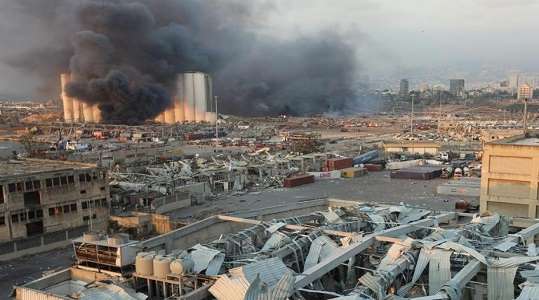A huge explosion occurred in the port of Beirut, causing 73 deaths and more than 3 thousand wounded (indeterminate toll), as well as huge material damage in many neighborhoods of the capital and its environs, according to the Lebanese Health Minister Hamad Hassan.
Beirut Port is considered the most important port in Lebanon, and one of the most important ports in the eastern basin of the Mediterranean.
Due to its strategic location, this port, which opened in 1894, was used to import basic materials from countries of the world and export them through the Lebanese interior to the countries of the Middle East.
This port is considered an essential pillar of the Lebanese economy. As it plays an essential role in the import and export process and thus moving the Lebanese economic wheel.
The Port of Beirut deals with 300 international ports, and the number of vessels that dock at it is estimated at 3,100 ships annually. The harbor consists of 4 basins up to 24 meters deep, in addition to a fifth basin that was under construction. It also includes 16 berths, several warehouses and wheat storage silos that provide the best storage conditions.
The stoppage of the port will result in a huge loss that will affect billions of dollars on the Lebanese economy, and these billions will be divided into two parts. Part of the result of the port's failure to work, and the second part: the cost of damage to the port.
The import and export traffic will stop for a while, except for losses whose size cannot be estimated at the present time, but it will certainly be huge, as the loss will also include the movement of berths for ships, and the customs sector will be affected, as Lebanon will lose customs duties every day.
In a quick effort by the authorities to mitigate the losses, the Supreme Defense Council in Lebanon recommended preparing the port of Tripoli (in the north of the country) to secure commercial operations from import and export.
The Minister of Economy, Raoul Nehme, indicated in a press statement carried by the official Lebanese agency, that "the wheat stored in the silos of the Beirut port cannot be used because it has become contaminated by the explosion."
Prime Minister Hassan Diab announced that today, Wednesday, is a day of national mourning, and he promised that those responsible for this disaster will pay the price, and appealed to "brotherly and friendly countries" to help "the afflicted Lebanon". While the Supreme Defense Council in Lebanon declared Beirut a "disaster city", within a package of decisions and recommendations to confront the repercussions of a huge explosion that occurred in the capital.
Source (Al-Arabiya.net website, Edited)

